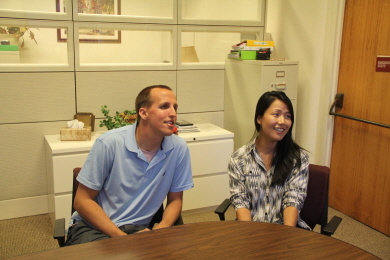In the previous issue, Ewha Voice explored the endeavors of New York City for the inclusion of LGBT people in universities and society. Following up on the first article of a two-part overseas coverage about inclusive college life, this issue of Ewha Voice will mainly discuss another marginalized group on campus: students with disabilities. Syracuse University, located in the state of New York, is at the forefront of disability research and advocacy, offering one of the oldest and largest disability studies programs and having the only university-based cultural center for disability in the world.

Disability Studies program suggests new perspective
TAB, or the Temporary Able-Bodied, is a term disability activists use to refer to those who are not physically or mentally impaired. They believe it is a temporary state, which many of us will have to go through at some point in our lives. This notion has become a significant part of Disability Studies, a field that did not exist a few decades ago. Demographic statistics tell us the reason: the number of the disabled in Korea has grown rapidly in recent years by 162 percent between 2000 and 2012 and is expected to grow in the future according to the Employment Development Institute.
Disability Studies emerged under the premise that disability should not be viewed using a clinical, medical or therapeutic perspective; that is, disability should not be viewed as a problem that must be “fixed” or “cured.”
“Here, disability is not regarded as a rehabilitation problem,” stated professor Stephen Kuusisto, who teaches a Disability Studies class at Syracuse University (SU). “Rather, we see it as a social, cultural and political phenomenon, and as an important part of multiculturalism in our society, as significant as African American awareness.”
The Disability Studies program at SU is an inter-disciplinary field offered as undergraduate minor or a Certificate of Advanced Studies. Students majoring in the field not only take related courses as part of their academic track, but also work collaboratively at research centers where they focus on their own specialized area of interests.
Recently, several undergraduate students minoring in Disability Studies collaborated with the Taishoff Center for Inclusive Higher Education, a research center committed to higher educational opportunities for autistic students. They worked together on a poster titled “10 Tips for Students with Disabilities from Students with Disabilities.” Such tips included, “Disability accommodations are rights, not special help,” and “Never apologize for your disability or your accommodations,” to list just a few.
“The recent work done with students was a pioneering one, not just because students loved it, but also because the work provided a great experience for students pursuing Disability Studies,” said Dr. Beth Meyer, the director of the Taishoff Center.
Apart from a few universities in the United States that have Disability Studies program including SU, most universities, including those in Korea, academically highlight disability issues only in Special Education. However, the programs offered at Syracuse are distinct from Special Education as they depart from the typical belief that teachers in Special Education only teach disabled learners, and teachers trained in Elementary Education do not.
“Inclusive Elementary and Special Education,” an integrated field under the Disability Studies program, challenges this common belief that Elementary Education and Special Education are completely separate. The designer who first introduced the concept of merging the two fields stressed that she wanted to emphasize the importance of understanding diversity in classroom settings.
Unfortunately, the way that the United States established its education system assumes that students with disabilities are completely different from students without. However, at SU, the Disability Studies program believes students with disabilities do not need to be on a completely different educational track.
“Regardless of the way you define what a good teacher is, teachers should be able to address, differentiate, and meet the different needs of a whole range of learners in their classrooms,” said Dr. Christine Ashby, a designer of Inclusive Elementary and Special Education. “Therefore, we require students to acquire degrees in both of the aforementioned fields to become elementary teachers.”

